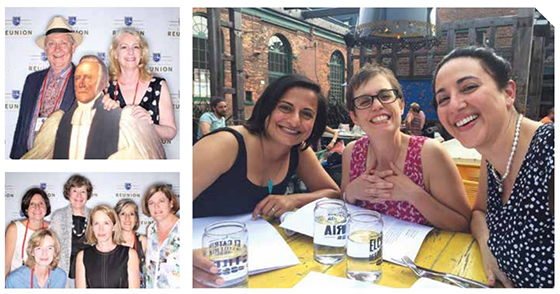 Spring Reunion 2017: Have you made your plans?
Spring Reunion 2017: Have you made your plans?
IN EARLY JUNE the Trinity campus will be abuzz with graduates young and not-so-young, as we gather to celebrate Spring Reunion from June 1 to 4. Dedicate a weekend to reconnecting with friends and classmates, reminiscing about your student days, and reigniting your relationship with Trinity College!
“We are pleased that the classes of 1972 and 2012 have chosen to support the Trinity Fund this year,” says Julia Paris, Assistant Director of Alumni Affairs and Special Events. Says Virginia Priscus ’92, “Fees alone don’t pay for everything—donations bridge the gap, and let the College further enrich the student experience. I have tried to donate to Trinity every year since I graduated, and I now give monthly.”
If you’re interested in making a Trinity Fund gift in honour of Reunion 2017, or in committing to an ongoing monthly gift, you are providing funds that immediately support students. For more information please contact Nazerit Hagos (416-946-7426, nazerit.hagos@utoronto.ca). See this issue’s Calendar, page 30, or visit the Reunion website at uoftrin.me/reunion for event details and to register. See you there!
HIGHLIGHTS WILL INCLUDE:
• Special celebrations and activities honouring class years ending in a 2 or a 7
• Multiple events and parties at the College and around the city over the Reunion weekend (some are anticipated to sell out, so get your tickets early!)
• A special 175th anniversary program for Divinity Associates
• Updates on alumni-sponsored projects, including:
• The Trinity Mental Health Program and Anne Steacy Counselling Initiative (supported by the classes of 1962 and 1992);
• Accessibility initiatives including the Junior Common Room Chair Lift (supported in part by the classes of 1967, 1982, 1987 and 2002);
• Scholarships and bursaries (supported by the classes of 1967 and 1977); and
• Trinity’s academic dons (supported by the class of 1957).
REGISTER NOW
DIVINITY PROFESSOR RECEIVES HONORARY DEGREE

Congratulations to Abrahim Habibulla Khan, professor and graduate director of Trinity’s Faculty of Divinity and the Toronto School of Theology, who received an honorary degree of Doctor honoris causa from Constantine the Philosopher University in Nitra, Slovakia in March 2017.
The honour recognizes Professor Khan’s significant contribution to Kierkegaard studies in Central Europe. Khan formerly served as president of the Canadian Theological Society and program chair at the American Academy of Religion, and is a former executive member of the International Association for the History of Religions. He is also a co-founder of the Institute for the Advanced Study of Religion (Trinity College), and convener of the Kierkegaard Circle (Toronto). In addition to being editor of the Toronto Journal of Theology, Khan serves on editorial boards or as a co-editor of seven or more serial publications.
TRINITY ALUMNI APPOINTED TO THE ORDER OF CANADA
ON DECEMBER 30, 2016, His Excellency the Right Honourable David Johnston, Governor General of Canada, announced new appointments to the Order of Canada. The new appointees include members of the Trinity community—congratulations to Trinity alumni Michael Ignatieff and Michael J. Sabia.
Member of the Order of Canada: Michael Ignatieff, P.C., C.M. ’69, for his contributions to the advancement of knowledge as a human rights scholar and reporter.
Member of the Order of Canada: Michael J. Sabia, O.C. ’76, for his entrepreneurial leadership of and contributions to the rejuvenation and transformation of several iconic Canadian companies.
The Order of Canada, one of our country’s highest civilian honours, was established in 1967, during Canada’s centennial year, to recognize outstanding achievement, dedication to the community and service to the nation.
HONOURING VIRGINIA MCLAUGHLIN
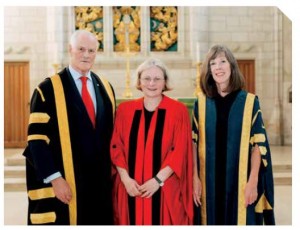
Chancellor William C. Graham, Virginia McLaughlin, Provost Mayo Moran
ON SEPTEMBER 7, 2016 Trinity Chancellor, The Honourable William C. Graham ’61, conferred an Honorary Degree of Doctor of Sacred Letters, honoris causa, upon Virginia McLaughlin ’74. McLaughlin was recognized for her lifelong dedication and exemplary service to Trinity College, and for her commitment and leadership in the areas of health care and the arts. She was presented by William J. Saunderson ’56 and hooded by Jill Carmichael Adolphe ’85.
TRINITY CELEBRATES CANADA 150
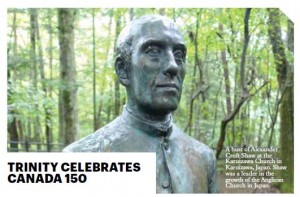 Not many universities can say they were around during the birth of our country. Trinity can, of course, and we are celebrating this milestone with a special online archives exhibit of the 10 graduates of the class of 1867: Frederick Barlow Cumberland, Charles Colley Foster, Thomas Garrett, Angus Ross Kennedy, Charles Russell Lee, Lewis Henry Moffatt, Ephraim Horace Mussen, Alfred Passmore Poussette, Alexander Croft Shaw, and Henry Harcourt Waters. Prepared by the students of the Trinity College Historical Society, the profiles can be read online at: http://uoft.me/1867.
Not many universities can say they were around during the birth of our country. Trinity can, of course, and we are celebrating this milestone with a special online archives exhibit of the 10 graduates of the class of 1867: Frederick Barlow Cumberland, Charles Colley Foster, Thomas Garrett, Angus Ross Kennedy, Charles Russell Lee, Lewis Henry Moffatt, Ephraim Horace Mussen, Alfred Passmore Poussette, Alexander Croft Shaw, and Henry Harcourt Waters. Prepared by the students of the Trinity College Historical Society, the profiles can be read online at: http://uoft.me/1867.
Sylvia Lassam, Rolph-Bell Archivist shares her thoughts on the class of 1867: “Of the 10, six became Anglican priests; of these three moved through small parishes in Ontario, one relocated to the U.S., one became a celebrated missionary to Japan and one, who was also a physician, might be described as a scoundrel (see Angus Ross Kennedy). There were three businessmen: one a very successful entrepreneur and author (Cumberland), one a career executive (Foster), and one with a series of successes and failures that took him to the mines of the B.C. interior (Moffatt). There was one lawyer in the group, also with business interests, who spent most of his life in Peterborough but suffered some sort of misadventure and ended up bankrupt in London (England). Only Charles Colley Foster stayed in Toronto his whole life; a surprising element of many of their lives is the extent of their travel.
About half the class also received an MA from Trinity College, and why not? The 1864 Statutes dictate that admission to this degree required a BA of three years’ standing, and various oaths and fees but no course of study.
There were no women of course. The admission of women and the founding of St. Hilda’s was several years in the future. All members of the class were from English, Irish or Scottish stock. Most were the first in their family to receive a university education. Several were members of the Masonic Lodge. Almost all fought in the Fenian Raids. The Rev. Lee was the only bachelor and most had children. There are frustrating gaps in the available facts, but due to the wonders of Ancestry and Google we’ve been able to trace their movements, if not the fine-grained details of their lives.
The year 1867 saw the birth of Canada and the death of John Strachan. Strachan, whose influence on the new country was substantial, was about to become part of the past. After his death, Trinity College would undergo changes unforeseen by the Founder. Trinity College was in the business of educating gentlemen, and aspiring gentlemen, who would add to the cultural, economic and spiritual life of Canada. In Strachan’s words: ‘Our first and great object will be ever to produce young men of moral worth and sound learning—men who will in after life do honour to their professions, and bless the Society in which they move.’ By that measure, Dr. Kennedy aside, the class of 1867 made a pretty good show.”
NEW ACCESSIBILITY LIFT TO THE JUNIOR COMMON ROOM
The College continues to update its infrastructure to improve accessibility, thanks to a new lift to the Junior Common Room (JCR). Located outside of Strachan Hall, the new JCR lift provides accessible access from the main floor to Strachan Hall.
The JCR lift was co-funded by Trinity College and the Student Capital Fund. Anthony Marchese ’17, Head of College, says the project came together quickly thanks to unanimous student support. “The Junior Common Room is such an important space,” he says. “It’s the hangout for undergrads, home to The Lit’s weekly debates—a real hub for the Trinity community. We felt it was really important that everyone be able to access it.”
Some reunion classes have also focused their 2017 reunion giving to support the JCR lift and accessibility at Trinity, including the class of 1967 who are celebrating their 50th reunion this year.
The College’s focus on improving accessibility continues to be a key priority. Located beside the Chapel doors and expected to be complete this spring, the much-anticipated elevator will provide accessible access to the three floors of the main building, including the new Trinity College Archives (lower level) and Seeley Hall (upper level).
MARGARET MACMILLAN TO RECEIVE HONORARY DEGREE FROM THE U OF T
CONGRATULATIONS to former Trinity Provost (2002-2007), internationally acclaimed historian and author Professor Margaret MacMillan ’66, who will be recognized with an honorary degree from U of T in a spring 2017 convocation ceremony. Professor MacMillan is currently warden of St. Antony’s College, University of Oxford (she is on leave from U of T’s department of history), and has recently announced that in fall 2017, she and Professor Robert Bothwell will be co-teaching HIS401Y: History of the Cold War.
ConnecTRIN PILOT BRINGS STUDENTS AND ALUMNI TOGETHER
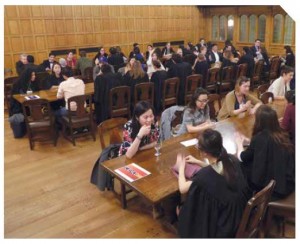 SPEED NETWORKING IN STRACHAN HALL? It happened this year, along with panel discussions and presentations, through a pilot project called ConnecTRIN: Student-Young Alumni Networking Dinners. Part of a broader plan to enhance the student experience and alumni engagement—a key goal of Trinity’s Strategic Plan—ConnecTRIN is designed to provide current students the opportunity to connect with Trinity grads from the last 10 years for career support and mentorship.
SPEED NETWORKING IN STRACHAN HALL? It happened this year, along with panel discussions and presentations, through a pilot project called ConnecTRIN: Student-Young Alumni Networking Dinners. Part of a broader plan to enhance the student experience and alumni engagement—a key goal of Trinity’s Strategic Plan—ConnecTRIN is designed to provide current students the opportunity to connect with Trinity grads from the last 10 years for career support and mentorship.
Sponsored by Manulife, a U of T Affinity Partner, the Wednesday evening events included High Table dinner, plenty of networking opportunities between alumni and students, and guest speakers who touched on themes including careers in media and the arts, and business and professional etiquette.
David Bronskill ’96, Chair of the Trinity College Board of Trustees, says the evenings have been very well-received by all attendees. “Hopefully our students benefit from the guidance of our accomplished alumni, but I know that our alumni are equally inspired by the successes that our students have already achieved,” he says.
David Plant ’77, Chair of the Alumni Association of Trinity College (AATC), worked with Peter Wismath ’94, Past Chair of the AATC and staff to develop the program.
“It is an immensely gratifying experience to speak with the students about their career and academic interests, and share real-world insights about ways to realize their goals,” says Plant. “Building a strong and productive relationship between students and alumni through mentorship and events like ConnecTRIN is a standing agenda item with the AATC. Thankfully we can rely on the input of our student leaders to ensure we are responding to student needs and aspirations in ways that are both useful and fulfilling for everyone involved.”
One of those student leaders is Thomas Robson ’18, Trinity’s Head of Arts. “When I ran for Head of Arts I wanted to do my best at ensuring that every student here had the opportunities that I’ve had: Making meaningful connections both within my year and with the years before me,” he says. “I believe that the minds that walk—and have walked—through Strachan Hall are some of the brightest in Canada, and I hope that we can continue to grow and foster relationships and connections between our students and alumni.”
Based on its early success, the ConnecTRIN series is expected to continue.
If you are interested in sharing your expertise in a specific discipline to contribute to this new initiative, please contact Jill Rooksby (416-978-2651, or jill.rooksby@utoronto.ca).
ConnecTRIN is supported by U of T Affinity Partner, Manulife

FROM THE ARCHIVES JOHN STRACHAN, 150 YEARS LATER
Like most interesting people John Strachan was complicated, writes Trinity’s Rolph-Bell Archivist. Perhaps it’s time to acknowledge— and celebrate—his softer side.
by Sylvia Lassam, Rolph-Bell Archivist
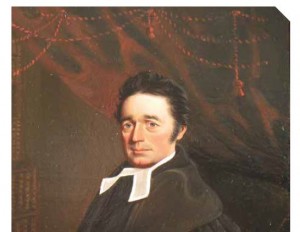 ON NOVEMBER 1, 1867, four months after the birth of Canada, John Strachan died. Perhaps there are other institutions whose founder remains a palpable presence after 150 years, but I suspect it’s unusual. It’s not just the images of him—in Strachan Hall, the Quad, and the Senior Common Room—that remind us of his presence, but also the look and feel of the College. Strachan asked the architect for the Queen Street building, Kivas Tully, to model Trinity College after St. Aidan’s, Birkenhead.
ON NOVEMBER 1, 1867, four months after the birth of Canada, John Strachan died. Perhaps there are other institutions whose founder remains a palpable presence after 150 years, but I suspect it’s unusual. It’s not just the images of him—in Strachan Hall, the Quad, and the Senior Common Room—that remind us of his presence, but also the look and feel of the College. Strachan asked the architect for the Queen Street building, Kivas Tully, to model Trinity College after St. Aidan’s, Birkenhead.
When Trinity moved to Queen’s Park in 1925, the architect Frank Darling was asked to model the new Trinity College on the old. So here we are, all these years later, still moving about in John Strachan’s college. The force of will that drove him, a relatively old man, to start over after the secularization of King’s College (which became the University of Toronto), still crackles around the place. I also see it embodied in the character of Trinity students, for whom, like Strachan, giving up is not an option.
A strong personality like Strachan’s is easy to lampoon, and he is often seen as the stern old man, inflexible, driven, humourless. The painted portraits for the most part reinforce this view. But, as the archivist of Trinity College, I encounter Strachan from time to time, and I have to say that my impression of the man varies considerably from the stereotype. Starting with a lesser-known portrait, small and unattributed, that lives in the Registrar’s office, we see the Founder identified by his dress as a cleric, and by his books as a scholar. He’s rather handsome with his piercing blue eyes and cleft chin, and quite sympathetic, not at all the fearsome old man of the later portraits.
Consider this valentine he wrote for his wife, Anne Magill Strachan, about 1847:
Some forty years have passed away
Since I was heard in truth to say
I take you for my wife today
– dear Annie
Me thinks I see and hear thee now
With trembling take the marriage vow
And still the same good wife art thou
– dear Annie
To me no ebb they kindness knows
But like a stream perpetual flows
On may it flow to life’s calm close
– dear Annie
Tho’ cares and sorrows not a few
Our path have crossed they but renew
Our love so that it firmer grew
– dear Annie
Our hairs that here and there turn grey
In silent accents seem to say
All mortal beauties fade away
– dear Annie
O may our peaceful lives decline
Like cloudless suns that set to shine
In other worlds with light Divine
– dear Annie
Apart from the fact that he signed it “John Toronto,” his official moniker, it’s absolutely lovely.
Consider the young John Strachan as schoolteacher in Kingston and Cornwall, who found that there were no textbooks suitable to train young men for life in Canada, so he wrote his own. Far from being dry, his classes included “the Latin classics, Arithmetic, Bookkeeping, Elements of Mathematics, Elements of Geography, of Natural and Civil History…The whole was interspersed with different pieces of poetry and prose, many of the most humourous cast, composed for the occasion.” His students were so attached to their master that years later they took up a collection and ordered a silver epergne from a London jeweller and presented the magnificent gift to Strachan in 1833. When he accepted it, Strachan pronounced himself “…totally unable to give utterance to the emotions with which it is agitated; deep and lasting as my existence will this proof of your friendship be retained…”
Strachan received another valuable gift of silver from the city of York, presented as a “memorial of their respect and gratitude for his fearless and humane devotions to his pastoral duties during seasons of great danger and distress from the visitation of an appalling pestilence.” This was in response to Strachan’s extraordinary compassion during the cholera epidemic of 1832, when he barely slept for days on end as he gave comfort to the sick and dying.
There are also reports of the long and arduous journeys Strachan made as Archdeacon of York to minister to his farflung parishioners. He travelled hundreds of miles through the bush to perform weddings and baptisms, to preach sermons, to tend his flock. He loved luxury (his well-appointed home at Front and York Streets was nicknamed “The Palace”), and he had strong views on aesthetic matters like the architecture of his university. He had lifelong friendships and was devoted to his family. He and his wife suffered the losses of all their children except for one, and in 1865 Strachan lost his Annie after 57 years of marriage. He died in his 90th year, working almost to the end. In his will, Strachan left Trinity College his library and his epergne: symbols of his passion for education and his love of beautiful things.
Like most interesting people Strachan was complicated. He was hated by many and even now people have strong feelings and opinions about him. The thing about Strachan’s life that makes me gasp in wonder is his reaction to the secularization of King’s College. He was 71 years old. One assumes he had some middle-of-thenight doubts, but he picked himself up, went to England, got a new charter, badgered people he knew into giving him money, bought some land, found a building he liked and hired an architect to build it, and within a couple of years had a new university up and running.
The students at Strachan’s university have a history of academic excellence, civic engagement, participation in the arts. The bar seems to have been set by Strachan right at the outset. Perhaps it’s time, 150 years after his death, to acknowledge Strachan’s softer side—his kindness and generosity—and incorporate that into our model for moving forward.
NEW ARCHIVES OPENING
Alumni returning to campus for Reunion in early June may be among the first to see the eagerly anticipated Trinity Archives. Housed in the old Library quarters on the lower level, the new Archives will provide much-needed archival storage space, a designated reading room for researchers, and a new exhibit space to showcase Trinity’s treasures. The entire space will feature proper temperature and humidity controls in order to better preserve Trinity’s historical objects. A public hallway will function as a gallery space, featuring four beautiful, large cases that will display a variety of exhibits, both permanent and rotating. Trinity has been fortunate to receive support for the new archives from generous donors, the Students of Trinity College, and the Friends of the Library.

Sorry, comments are closed for this post.